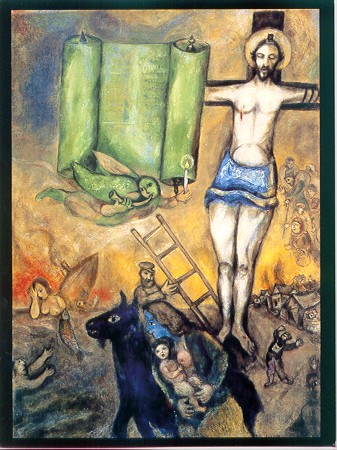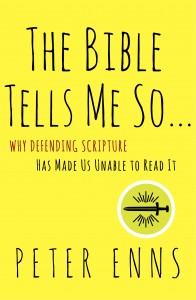As I wrote on Saturday, I led the sermon time at Solomon’s Porch on Sunday. As is our practice, we’re working our way through a book of the Bible, and this time it’s Genesis (I think it’s the second time in the 10-year history of Solomon’s Porch that we’ve gone through Genesis). Last night it was the part of Genesis that we moderns refer to as “chapter 22,” otherwise known as the “Binding of Isaac,” (or sometimes misleadingly called the “Sacrifice of Isaac”).
It was a brilliant and fascinating discussion at both the 5pm and 7pm gatherings. Here are some of my random highlights:
The tone was set early in the discussion by a young mother who, with a baby at her breast, declared, “I’ve got to be honest. I hate this text. I wish it weren’t in the Bible.” Others agreed, including another woman who told me afterward that whenever people try to apologize for Abraham, it reminds her of growing up in a dysfunctional home with an abusive parent, about whom people would often say, “I’m sure she’s doing the best she can,” instead of dealing with the problem.
That being said, others did speak up on Abraham’s behalf. An effort was made to get behind the text and determine what really happened as opposed to what was reported by Abraham and Isaac, the only two eyewitnesses to the incident.* To that, another person responded that as he is reading through Genesis, he’s convinced that the book’s power is its mythopoetic nature, and he encouraged us not to take it literally. I responded that regardless of whether one thinks this episode actually happened, and whether it happened as it’s written — and we surely had persons on all sides of that in the room — we nevertheless have to roll up our sleeves and deal with what’s actually on the page.
We wondered why the Angel of the Lord is so intent in referring to Isaac twice as, “your son, your only son.” In other words, what is Ishmael, chopped liver? It’s clear that the narrators of the story are making it doubly clear that Ishmael was not only excommunicated from Abraham’s camp, but is no longer even considered a product of Abraham’s loins.† A product of the Pagitt loins told us that in the Koranic version of this story, it’s Ishmael and not Isaac who is bound by Abraham.
We considered the silence of Abraham: Why didn’t he argue with God? It’s not like he has a compunction against talking back to God, for earlier in the narrative he negotiates with the Lord on behalf of Sodom and Gomorrah. Job argues with God when tragedy befalls him, and even Jesus asks that the cup be taken from him on the night of his arrest.‡ It would be very much in keeping with the biblical narrative for Abraham to try and talk his way out of the slaying and burning of his own son, but he doesn’t.
We also considered the silence of Isaac. The question of Isaac’s age was asked, for which there is no answer (we often think he was a boy, but there is a rabbinic tradition that he was 33). The narrators humanize Isaac by giving him a voice when he asks, “The fire and the wood are here, but where is the lamb for a burnt-offering?” With all of the conversation that must have occurred during their three day journey to the land of Moriah, it’s surely significant that this is the only interaction that’s recounted. We’re not told that he argues as he’s being tied up. The always brilliant Tim Lyles asked if this entire episode has something to do with the fact that, among the patriarchs, Isaac gets far fewer column inches in Genesis than either Abraham or Jacob. To the question, why does Abraham alone return to camp after this, we decided that Isaac may have needed a little space from his dad. We also briefly considered Isaac’s therapy bills.
We talked briefly about the passage in Hebrews in which it’s reckoned that Abraham had faith that Isaac would be resurrected by God after the slaying and burning.§ I think it’s safe to say that very few in the room found this explanation of Abraham’s behavior very compelling.
I talked a bit about Kierkegaard’s book, Fear and Trembling, in which he makes Abraham an archetype of the Knight of Faith and argues that religion is an absolute relation to the Absolute which on occasion transcends the universal ethical code. The more I consider this, the more I think that even Kierkegaard’s treatment of this text is something of a cop-out.
And we closed with a song by Ben that ruined Mike Stavlund’s faith. In the song, Ben considers the only two options that he thinks are reasonable: Abraham either believed that the Lord would provide a way of escape from the slaying of his son, or else he was crazy. Ben’s song also gives Isaac a voice as he’s being bound: “Daddy, I promise I’ll be a good boy.”
In the end, I can agree with the several people who talked to me after the gathering and said that they’ve never been to a church that could have such a deep — and deeply troubling — conversation about Abraham’s binding of Isaac.
*I distinctly recall Walter Bruegemann at the Emergent Village Theological Conversation in 2004 saying that we cannot get behind the text, especially with the Old Testament. We’ve got to deal with what’s on the page and not try to divine what “really happened.”
†At this point, I made an allusion to The Jazz Singer starring Neil Diamond and Sir Laurence Olivier (yes, that’s right), in which the latter rips his own coat and declares, “You are dead to me,” because his son has decided to sing jazz rather than be a cantor. It may go without saying, but this movie reference was lost on all but three people in the room.
‡There’s “rule” at Solomon’s Porch (we’re not so good at rules) by which we are not to look to other books of the Bible to help us figure out the book that we’re studying. I broke this rule repeatedly last night.
§See ‡.











